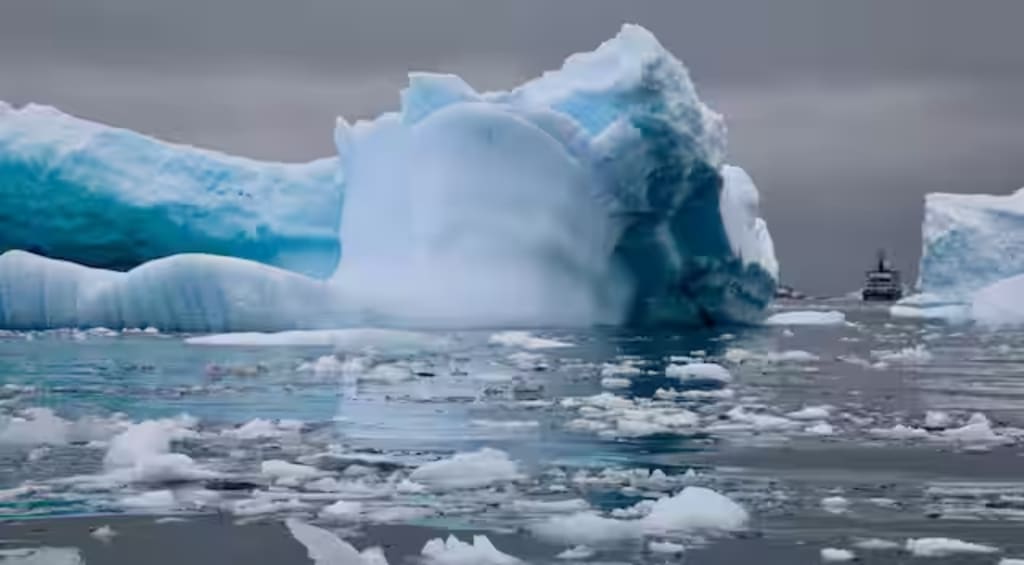Antarctica lost ice cover equivalent to the size of Turkey in last three years: Scientist
Scientist

Turkish scientists have claimed that Antarctica has lost ice equivalent to the size of Turkey in the last three years alone. Researchers who are working on the continent reached this conclusion after studying data from UAVs and satellites and tracking parameters like atmospheric water vapour. This means that ice spanning over 785,000 square kilometres (303,090 square miles) has disappeared from the continent during this period.
The data from the equipment showed an average decrease of 7 cubic metres (247 cubic feet) in a 100 square m (1,076 square ft) area of ice and snow cover at Horseshoe Island between 2022 and 2023.
Scientists warned if the current ice melting rate is not reined in, the concentration of water vapours and other greenhouse gases may increase in the atmosphere, potentially accelerating climate change.
"We are able to track the retreat and changes in glaciers year after year through drone footage, equipment readings, and GNSS (satellite navigation) stations we set up at our research sites in Antarctica," Ozsoy told Anadolu, said Professor Burcu Ozsoy, head of the first Turkish polar research center.
Stressing that data collected over several years showed glaring losses, Ozsoy said: "If we extrapolate the amount we measured in these past three years to the entirety of Antarctica, the ice loss we witnessed would be equivalent to the size of Türkiye."
Fahri Karabulut, a researcher from Istanbul’s Yildiz Technical University participating in the expedition said they could observe an ice loss of 10 per cent in glaciers using drones.
"Using drones, we observed an area reduction of approximately 10% in the glaciers. Extrapolating this ratio, the ice loss equates to an area roughly the size of Türkiye," Karabulut said.
Scientists also observed cracks in the glaciers. “This allows us to observe and quantify melting both visually and numerically, offering firsthand insights into the consequences of global warming," he added.
Recent findings have unveiled a stark reality: Antarctica, Earth's southernmost continent, has undergone a staggering transformation over the past three years. Scientists reveal that the ice loss from Antarctica during this short span is tantamount to the landmass of Turkey. This revelation demands immediate attention and comprehension of its profound implications.
Visualize Turkey, with its sprawling landscapes and bustling cities. Now, envision this entire expanse engulfed by ice – a representation of the colossal ice mass that Antarctica has shed. It's an astronomical loss, unfolding at an alarming pace.
But what does this signify? Antarctica hoards an immense volume of ice, and its dissolution contributes significantly to the surge in global sea levels. This surge spells peril for coastal regions, jeopardizing residences, urban hubs, and biodiversity. Furthermore, it disrupts ecological equilibrium and exerts a pervasive influence on worldwide weather patterns.
What drives this rapid ice loss in Antarctica? A primary culprit is the specter of climate change. As temperatures ascend due to anthropogenic activities such as fossil fuel combustion and deforestation, Antarctica's ice undergoes accelerated melting. Elevated temperatures trigger the disintegration or collapse of ice shelves – expansive floating platforms encircling the continent. Consequently, more glacial ice spills into the ocean, exacerbating sea level rise.
Additionally, alterations in oceanic currents and atmospheric circulation patterns around Antarctica contribute to the dynamic shifts in ice dynamics and melt rates.
The imperative task of scientists lies in meticulously scrutinizing these transformations to fathom their repercussions fully. Employing an arsenal of satellite imagery, drones, and ground-based research stations, scientists vigilantly monitor ice dynamics, temperature variations, and allied parameters. Through data assimilation and trend analysis, they prognosticate future trajectories, furnishing policymakers with crucial insights to formulate strategies for climate change mitigation.
However, the onus of rectifying this ominous trajectory doesn't rest solely on scientists and policymakers. Each individual plays a pivotal role in combating climate change. By curtailing our carbon footprint – adopting energy conservation measures, embracing sustainable transportation alternatives, and championing renewable energy initiatives – we can stem the tide of planetary warming, safeguarding the icy sanctity of Antarctica and its ilk.
In summation, Antarctica's ice depletion, equating to Turkey's expanse in a mere triennium, portends a looming crisis with profound ramifications. It underscores the imperative for concerted global action to combat climate change and preserve the sanctity of our planet for posterity. Together, we must rise to the challenge, fostering a sustainable future and ensuring the enduring majesty of Antarctica for generations to come.





Comments
There are no comments for this story
Be the first to respond and start the conversation.